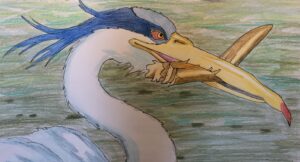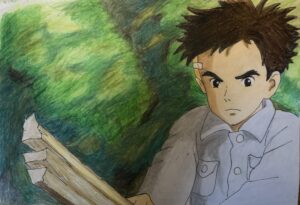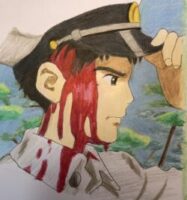I dedicate this to people who have already seen it. Note: If you haven’t seen it yet and are planning to watch it, please do not watch it. I will explain everything.
Looking at it again, drawing out each and every line, I realized that every line is very meaningful. I’m beginning to think that it’s a masterpiece like no other.
You may not understand the good points of this work at first glance. In the end, I think you have created the work that you truly wanted to create. Once again, it is a wonderful work.
However, it is a little difficult to understand.
Well, thank you for your cooperation.
It starts with an air raid siren going off.
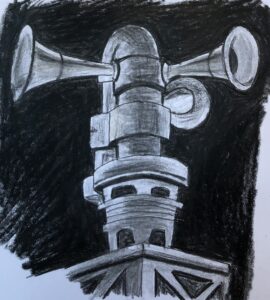
The sound wakes Mahito up. This name has a great meaning.
It was given with the hope that he would become a true human being. It is also the core of the story.
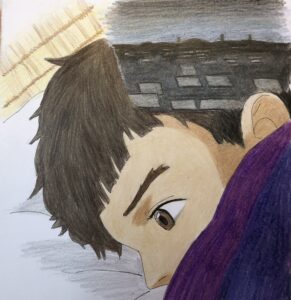
When I went up to the second floor, his father ran out of the house. As we passed each other, he said, “There’s a fire at Mom’s hospital.”
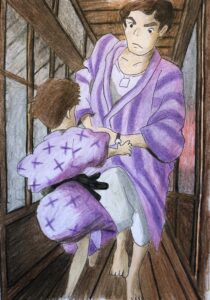
Mahito looks outside and sees the hospital on fire.
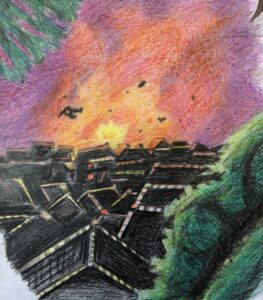
I’ve never drawn a picture of a fire before. I always have trouble figuring out how to paint it.
Mother
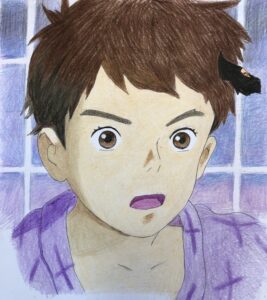
The town’s houses are on fire, and Mahito runs to the hospital, weaving through firefighters trying to put out the fires, townspeople calling for their families, and people wandering aimlessly. Mahito runs, covered in sparks. He prays for his mother’s safety.
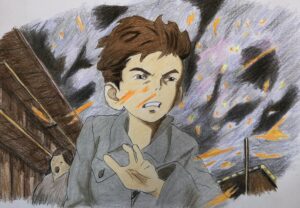
His mother dies in the third year of the war, and he leaves Tokyo in the fourth.
I didn’t think much of it when I first saw it, but it’s only been a year since his mother died. Now I understand what happens next.
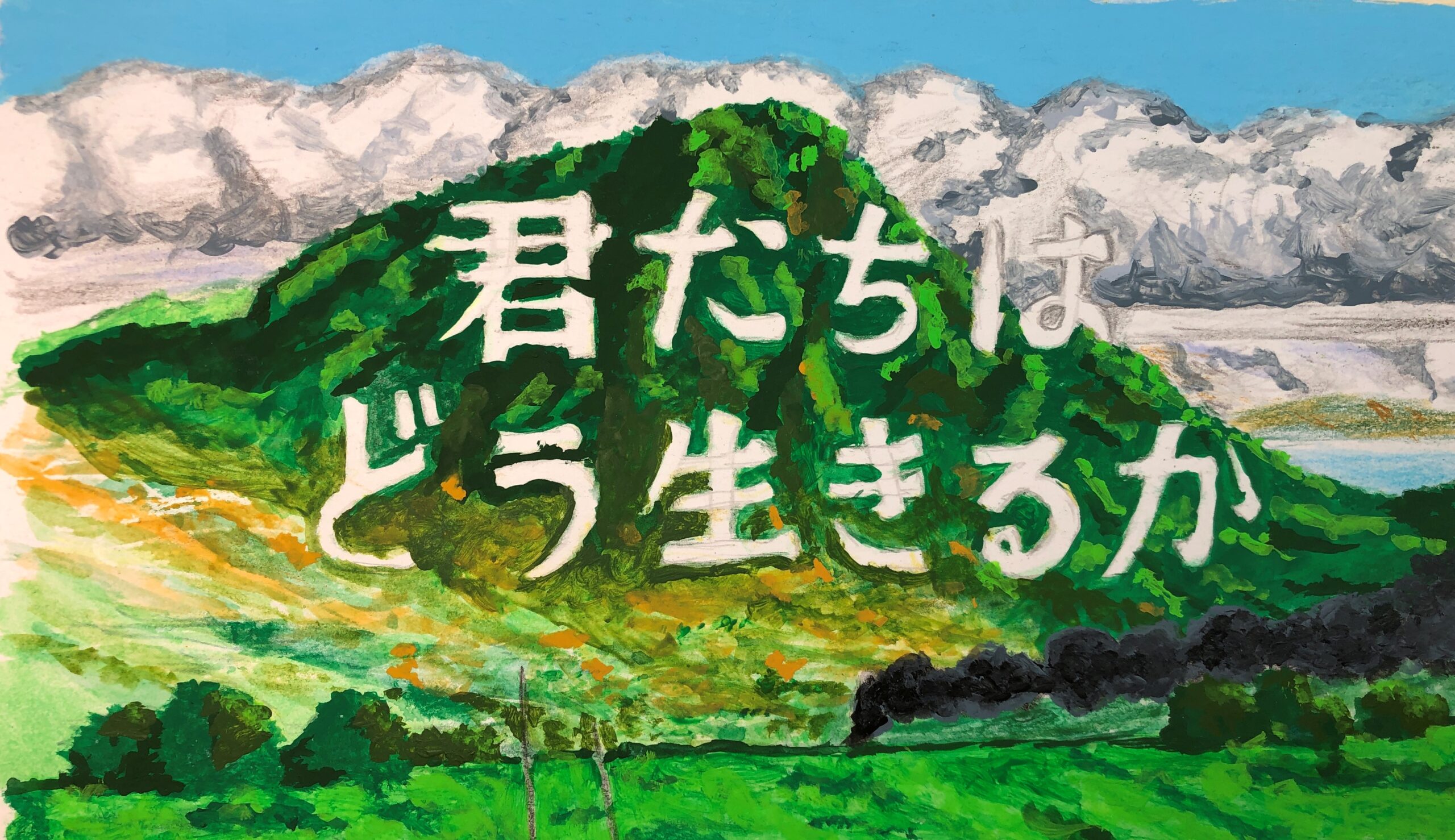
This work expresses the real world through the work, but I cannot say whether what is happening in reality is good or bad. That’s because I’m not qualified to do so.
Because I know that if my position changes, my thoughts will change.
There’s a difference between seeing something in front of you and seeing it from the broad perspective of the universe. Good and evil also change depending on whose position you’re in. I’m just explaining this work. That’s all.
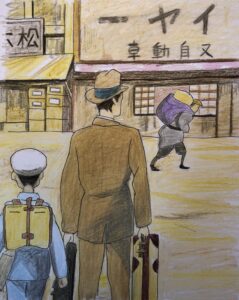
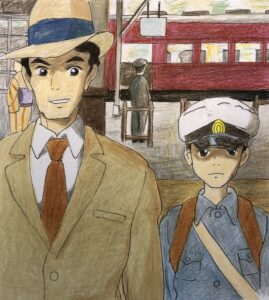
That person looked just like Mom.
This person is Natsuko. Mom’s younger sister. She is the older sister and Mom’s name is Hisako.
Mom appears in a different world, but her name has changed a bit. More on that later.
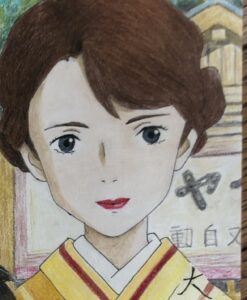
We had only met when we were babies, so this was the first time we had seen each other’s faces.
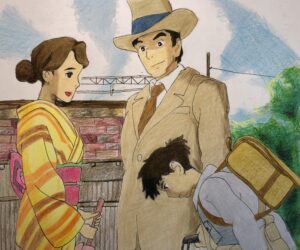
Mahito and Natsuko head to Natsuko’s parents’ house. At that time, Natsuko says to Mahito.
I’m going to be your new mother, Mahito. Give me your hand. Can you feel it moving?
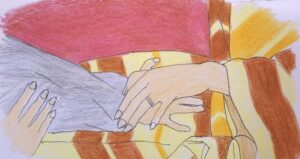
A baby. It’s Mahito’s little brother or sister.
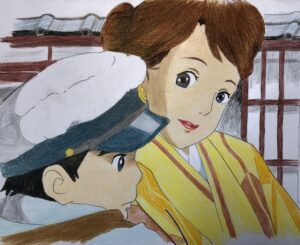
A year after their mother’s death, Natsuko’s younger sister’s stomach becomes enlarged.
In other words, it happened just a few months after their mother’s death.
We now understand the anguish Natsuko experiences after this. It’s no wonder she is mentally ill.
You can’t tell from this scene that she is suffering from the immense guilt she is carrying.
I watched it twice and now I understand. The first time I watched it, I didn’t realize why she was suffering so much.After this, Natsuko’s older sister and Masato’s mother appears, and her words to her younger sister show how kind she is to her younger sister. The feeling of having betrayed that kindness is very heavy.
(Translation is incorrect)
“This is my father’s new factory.”
Natsuko is wealthy and lives in a castle-like house, even though she lives in the countryside.
Mahito’s father also runs a military-related manufacturing company, and is probably the president.
After all, when her sister Hisako died, I wonder if Natsuko had a child to protect her wealthy lifestyle. There are people who have land and a house but no money.
I don’t know the truth of the matter, but…
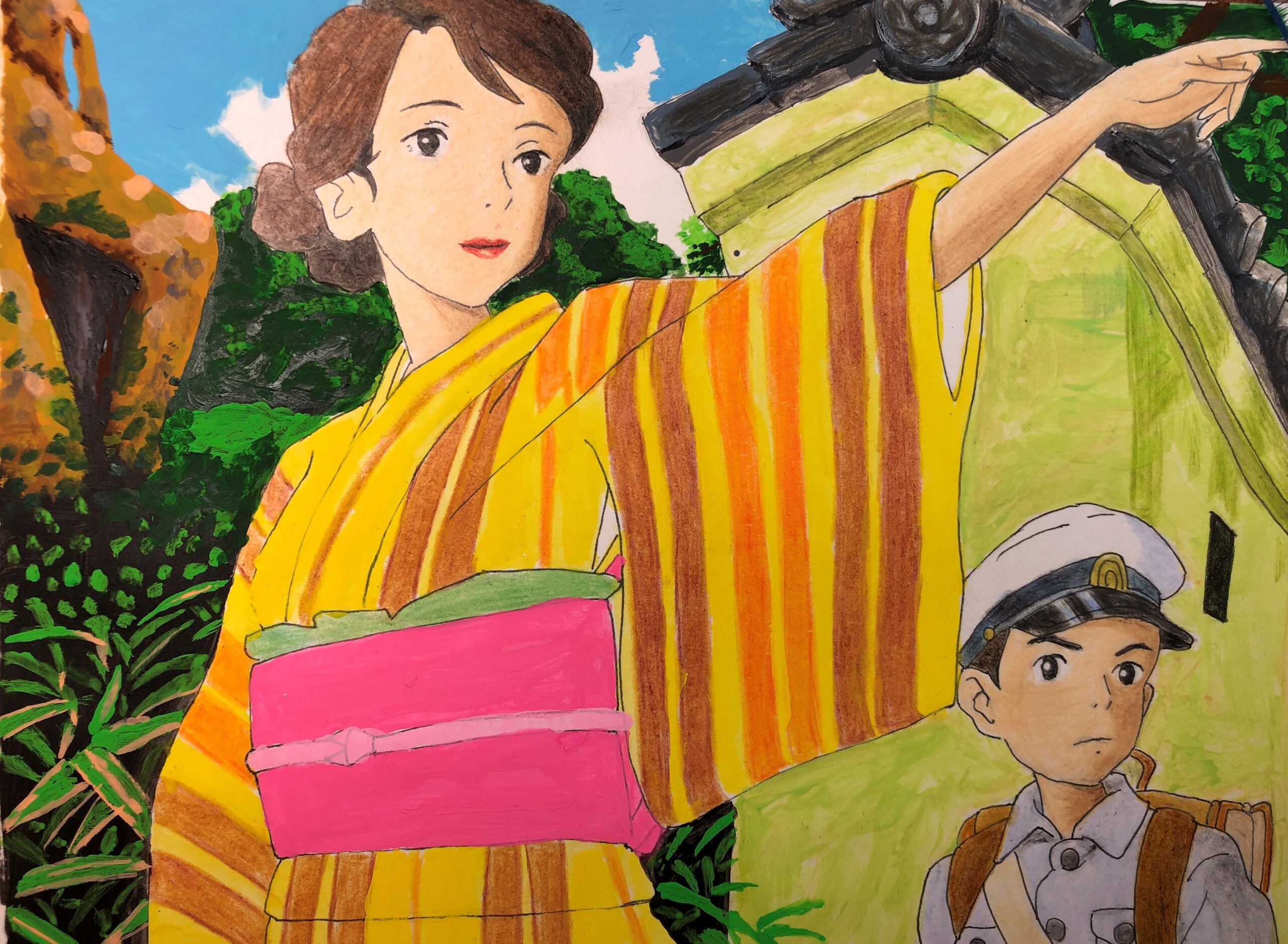
A heron welcomes Mahito. I thought Miyazaki hadn’t used a heron for no reason, so I looked into it and found out that in Japan, herons are messengers of the gods. They play that role in the film too. Another reason is that it is something that is passed down to the Celts. The Celts originally had the same religious ideas as the Japanese, including nature worship, polytheism, and megalith worship. To the Celts, herons were thought to be able to travel between heaven and earth, and they saw them as messages from the gods.
I think this is where the director decided to include a heron.

Natsuko’s mansion has nine servants, one of whom is sick.
They are all elderly, but they seem to be having a great time. This gives us some insight into Natsuko’s character. She is a very warm and kind person. Otherwise, elderly people wouldn’t look so happy and lively. And what’s more, she even takes care of the sick person. Because she is such a kind person, her suffering is great.
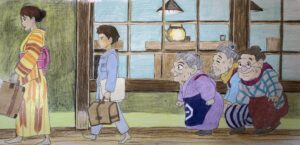
As soon as I entered the room, I fell asleep and cried while dreaming about her mother.
It’s only been a year since she passed away.
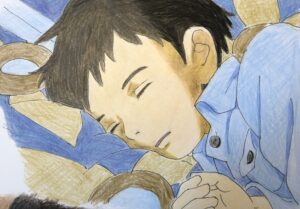
Natsuko looks at Masato’s sleeping face. The old ladies are amazed at how much he resembles her mother.
What does Natsuko think when she sees Mahito resemble her sister?
Personally, I think Natsuko is the most beautiful woman in a Ghibli film.
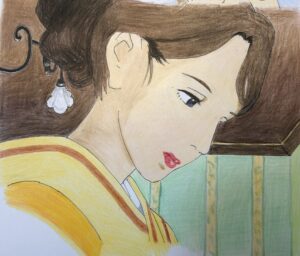
A mysterious building has been constructed in a detached building on the mansion’s grounds.
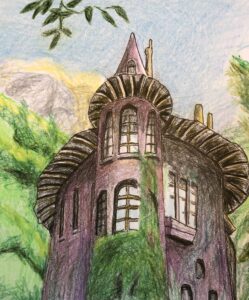
A grey heron roosts on the building.
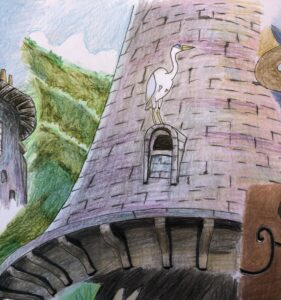
That tower was built by our mother’s great uncle.
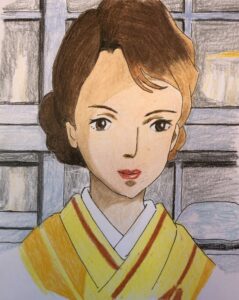
she’s great uncle is clearly not Japanese. If he were still alive, he would be around 90 years old.
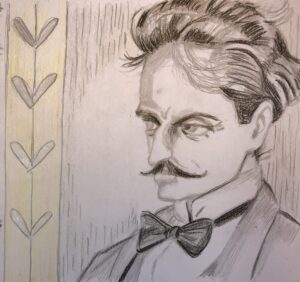
One day, the great uncle disappeared. After heavy rain, a maze-like tunnel was found underground, but it was closed up because it was dangerous. Mahito, please don’t go near it.
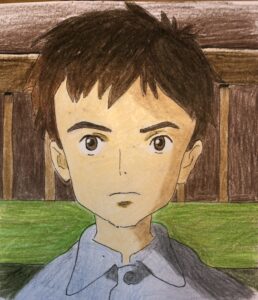
Mahito is going to school. As he parks his car in front of the schoolyard, the teacher bows. At this point, one of the students is already about to jump on him.
During the war, no one had anything to eat and everyone struggled just to survive.
Just because they were rich, they were seen as the enemy. This may provoke resentment among the children, but the student is showing off his power and wealth to the teacher, and seems to be saying that he is entrusting his child to him. The student is carrying a large basket. I wonder what it is, but…
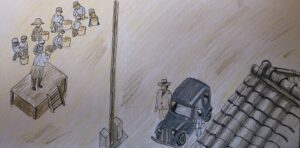
When we first met, He was glared at straight away. “Don’t get too cocky just because you’re rich.”
This is the envy and jealousy of the poor towards the rich.
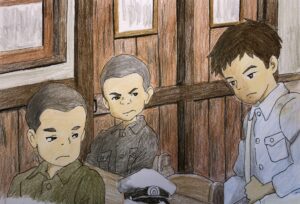
On the way home from school, I encountered some students mowing the grass. This is why the students were carrying baskets. They were probably saying, “Why don’t you mow the grass? How arrogant!” A fight broke out.
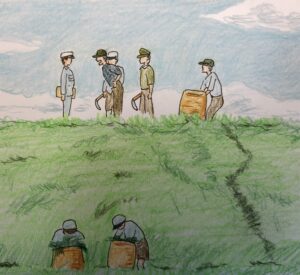
His clothes are a little dirty, but he doesn’t seem to be injured.
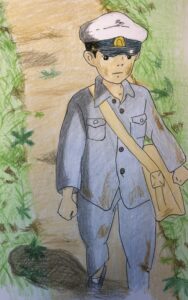
Mahito picked up a big rock from the ground, aimed it at his temple, and hit it with all his might…
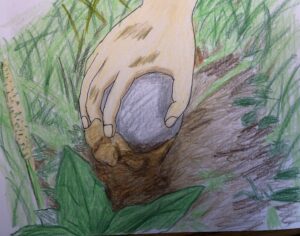
Why did he do this? Because he didn’t want to go to school, even if it meant enduring the pain. He was looked at with hatred because he was rich, but that was a reality that Mahito couldn’t do anything about, and he couldn’t change it.
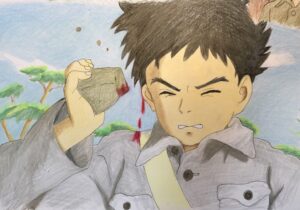
It’s not a good way to do it, but Mahito can bear it if he doesn’t have to go to school even if he has such wounds. The wounds in his heart are much bigger. It’s been a year since his mother’s death, and he must be exhausted.
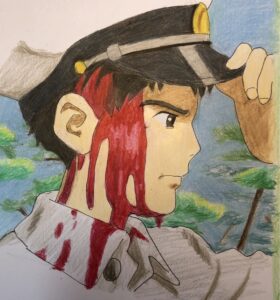
“Who did it? I’ll avenge you. Tell the truth,” his father says, but Mahito says he just fell. He knows his father won’t believe him. Mahito didn’t hurt himself because he hated the person he fought with.
As long as he doesn’t have to go to school, that’s fine. That’s why he just says he just fell.
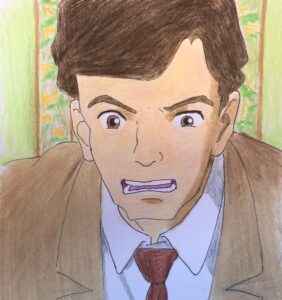
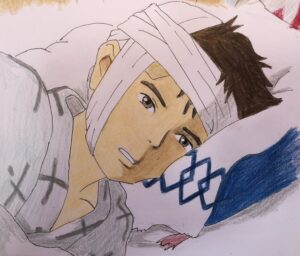
When Mahito is alone and closes his eyes, he hears a noise coming from the window and a voice saying, “Mahito, help me.”
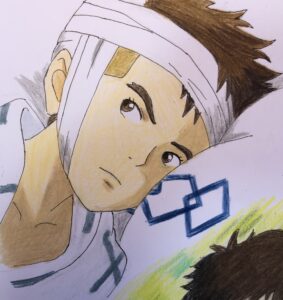
“Mahito, mahito,” the heron says, and flies off to the pond.
When he gets to the pond, the heron says, “Mommy, Mommy.”
The heron seems to be provoking Mahito.
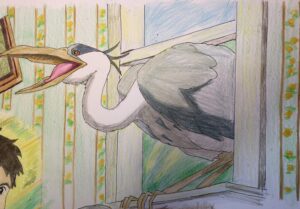
The next morning, Mahito wakes up early and goes out to the garden with the wooden sword he had kept in the shed.
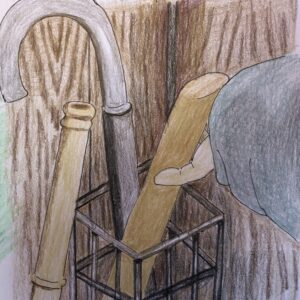
When Mahito sees the morning sun, a heron flies towards him.
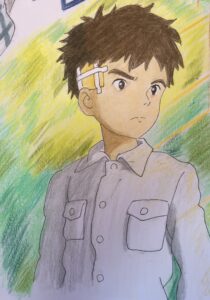
Mahito hits the heron with his wooden sword as hard as he can, but the sword breaks.
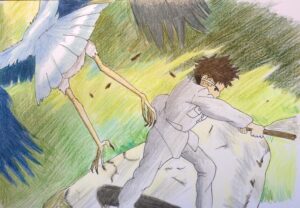
Who are you? You’re not just a heron.
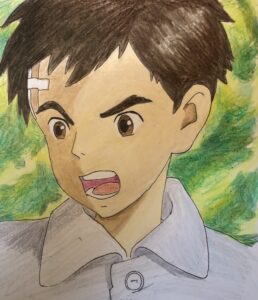
The heron breaks the wooden sword into pieces with its beak.
